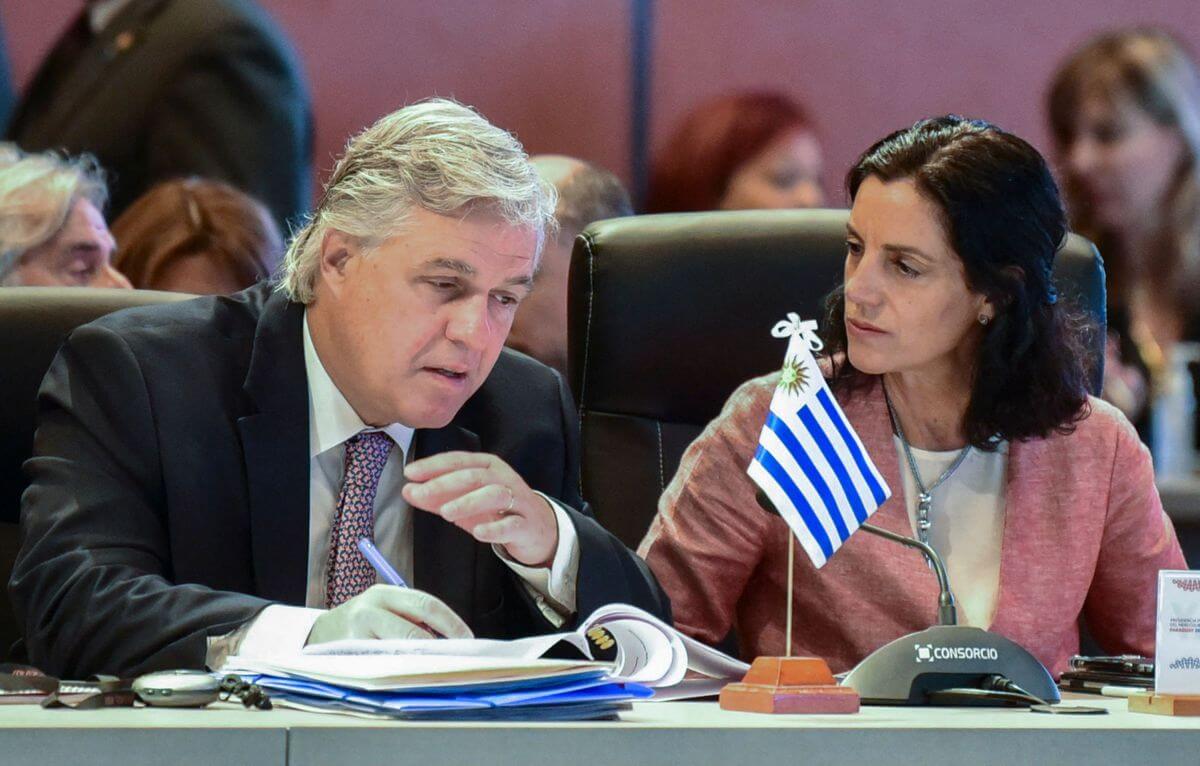At the Mercosur Common Market Council meeting in Paraguay on Wednesday, Uruguayan Foreign Minister Francisco Bustillo reaffirmed the Lacalle Pou administration’s resolve to finalise a free trade agreement (FTA) with China despite the disapproval of the regional bloc, saying Montevideo will exercise its “power to negotiate international trade agreements with third countries.”
Bustillo underscored that Uruguay will move forward with the bilateral trade pact, either “with our partners” in the Southern Common Market (Mercosur), or “individually,” adding that “we’ve been transparent and we’ve told all major partners about our intention.”
Bustillo vowed to maintain “frank dialogue” with partner nations to assuage their concerns and in the same vein, reiterated Uruguay’s “permanence” in Mercosur but said this will be in a “free and sovereign manner.”
🇺🇾#Bustillo: «Reafirmamos nuestra potestad de negociación con países y bloques extrazona». Durante la reunión del #Mercosur, el canciller defendió las negociaciones con #China y cuestionó que se ponga en duda «la convicción integracionista de Uruguay».
— Radio Uruguay (@RadioUruguayUy) July 20, 2022
👉 https://t.co/x4vq1TTxPL pic.twitter.com/iAkN2qypnz
Expanding on the reasons for this breakaway, Bustillo reiterated Montevideo’s concerns about Mercosur’s unwillingness to ‘modernise,’ describing the bloc as an “imperfect customs union.” He denounced the high common external tariffs for not offering any significant benefit and lamented how the grouping has failed to achieve its objective of a customs union.
To this end, he pledged Uruguay’s commitment to work towards “the modernisation of the bloc in terms of external relations,” highlighting that improving Mercosur’s access to foreign markets cannot be delayed any further.
He added that Uruguay is not only finalising an FTA with China but also holding talks with other countries.
His comments precede the presidential summit scheduled to be held today, which is expected to hold discussions on the bloc’s trade relations with China, with Mercosur insistent that Uruguay’s FTA with China must be finalised with “consensus,” as the group’s rules prohibit nations from pursuing unilateral trade deals.
El eje de la agenda está cruzado por debate derivado del anuncio del gobierno de #Uruguay sobre el interés de avanzar (unilateralmente o en conjunto... quien sabe) un TLC con #China pic.twitter.com/IxCtEEkzBb
— Emanuel Porcelli (@e_porcelli) July 20, 2022
In this regard, Paraguayan Foreign Minister Julio Cesar Arriola, whose country does not share diplomatic ties with the Asian giant owing to its closeness with Taiwan, denounced the move and stated that “joint progress must be made towards prioritising the agenda for external negotiations,” adding that the “principle of consensus in decision-making” enhances the bloc’s “strength and negotiating capacity.” He thus urged Uruguay to comply with “the letter and the spirit” of Mercosur regulations.
This was echoed by Argentine Foreign Minister Santiago Cafiero, who stressed that unilateral trade pacts are “distorted” and prove “much more costly for our national and regional capacities.”
Para la Argentina modernizar no implica disgregar al bloque y la toma de decisiones unilaterales, sino asumir la responsabilidad de transformar y profundizar el proceso de integración.
— Santiago Cafiero (@SantiagoCafiero) July 20, 2022
¿Alguien puede imaginar con el corazón en la mano que vivirá mejor sin sus vecinos y hermanos? pic.twitter.com/BvUqdmf7g0
Wednesday’s meeting comes against the backdrop of Uruguayan President Luis Lacalle Pou’s declaration last week to “formally begin negotiations” with China, the South American country’s largest trading partner. Lacalle Pou insisted “that international law and the treaties signed by” his country enable it to “establish all kinds of agreements with different nations,” asserting that Montevideo is “not willing to stay still.”
In fact, Lacalle has repeatedly voiced his intent to go ahead with a Chinese FTA, despite fierce opposition from Paraguay and Argentina. For instance, in an interview in March with Telemundo, he demanded greater flexibility within the bloc, stressing that it shouldn’t become a “burden.”
El Canciller de Argentina, Santiago Cafiero, habló en exclusiva con @cnnee durante la Cumbre del Mercosur en Paraguay y respondió al planteo de Uruguay de negociar con China por fuera del bloque.
— CNN Argentina (@CNNArgentina) July 20, 2022
Mirá lo que contestó en una entrevista con @ivanpzs pic.twitter.com/WV1gjYboAc
He also acknowledged Argentine President Alberto Fernández’s opposition to Uruguay’s prospective deal with China, saying it is “public and notorious” that Buenos Aires “is not convinced” nor “are they happy” with Montevideo’s plans.
In fact, Argentine Foreign Affairs Committee Chairman Eduardo Valdés last week demanded the FTA must seek Mercosur’s approval and even accused China of attempting to break up the bloc.
However, Uruguay’s calls for more flexibility have been seconded by Brazil, whose foreign minister, Carlos França, has made a push for more openness while preserving the “central elements” of Mercosur’s integration. Additionally, Brazilian President Jair Bolsonaro has inked unilateral FTAs and pacts with third nations. To this end, the Brazilian leader has opted to sit out of today’s presidential summit due to tensions over common external tariffs.
El canciller brasileño, #CarlosFrança, afirmó este miércoles ante el Consejo del Mercado Común del #Mercosur que su país está dispuesto a una "flexibilización" del bloque, que permita una mayor inserción en los mercados globales. pic.twitter.com/xgamczXehY
— Montevideo Portal (@portalmvd) July 20, 2022
Fernández, meanwhile, has previously said that if anyone views Mercosur as a “burden [...] the easiest thing to do is to get off the boat.” As Uruguay’s deal with China nears completion, there is speculation that Uruguay may be kicked out of Mercosur.
While Argentina advocates in favour of regional protectionism, Brazil and Uruguay have been strong proponents of increased flexibility. Disputes have thus been frequent and remain unresolved, with divergent views making it a prolonged battle towards reform. Though Brazil and Argentina last October agreed to reduce common external tariffs by 10%, this fell well short of Brazil’s demand for a 50% cut.

